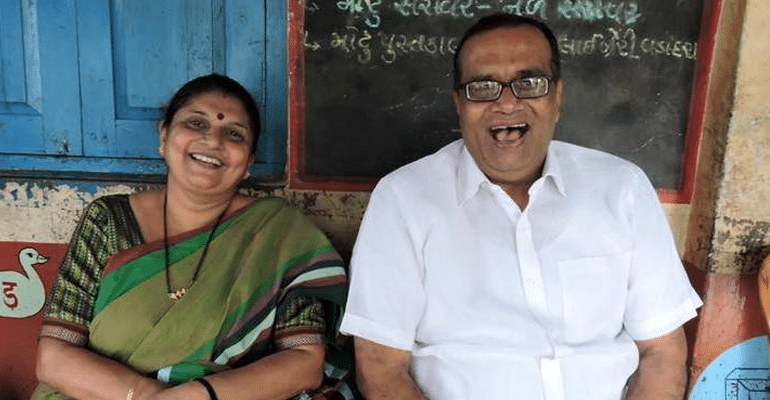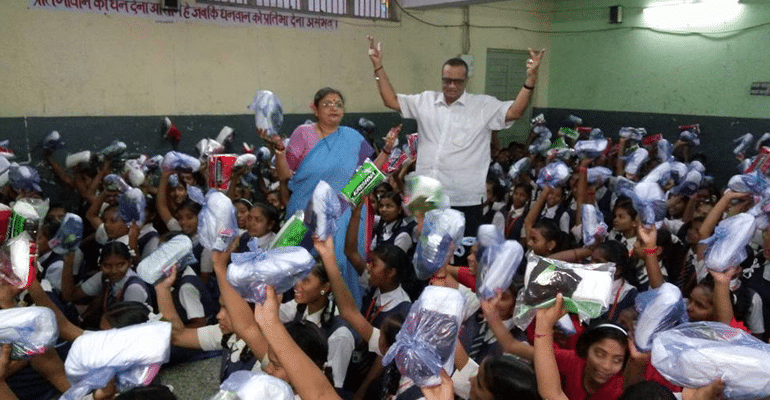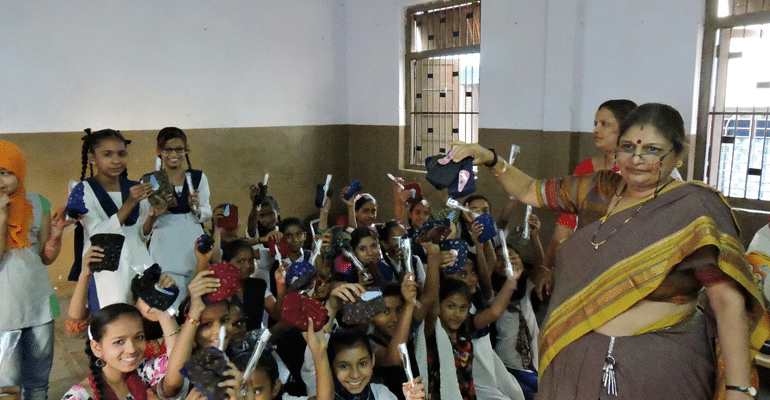In an interview with Akshay Kumar where he was discussing how much necessary it is to use sanitary napkins during menstruation, she quickly asked him one simple question- “If the children do not have underwear, how will they use pads?” She said Akshay was so overwhelmed to hear this and thought why it didn’t occur to him before. He got emotional and in a light-hearted reaction, he told her that he will cast her as a heroine in his next film. Further, he has also donated Rs.5 lakhs to support Meena’s work.
In a candid conversation with Life Beyond Numbers, the ‘Pad Couple’ from Surat says, “No child deserves to die because of the period stigma.”
Fondly called “Pad Dadi” by children in Surat, 61-year-old Meena Mehta was born and brought up in Mumbai and now is a resident of Gaurav Path, where she has been living for the last 42 years. Her husband, Atul Mehta supports her in every possible manner and as Meena says, he is the backbone of this project.

Meena and Atul were friends from Kindergarten and they grew up together literally. It was Atul who gave Rs.20,000 to his wife, to start the project. Since then, the elderly couple has been working towards the welfare of children and women for the last 6 years now and every month they provide hygiene supplies to more than 10,000 needy girls.
It was July 16, 2012, when the voluntary organization Manuni Foundation was established and since then the organization is working for the betterment of the children and women in the city. “Initially I started with 5 girls and now we provide feminine supplies to 35 municipal schools,” says Meena.
Every day she travels a distance of about 15-20 km from her home and reaches out to the underprivileged kids of Surat to make them feel emotionally and physically safe. “The purpose is to teach them hygiene right from childhood,” she says.
Apart from going to municipal schools, where girls from slums come to study, Meena also distributes pads to women in need through an event in Sarojini Naidu Garden in Umrah. “I have seen there are long queues and about 500 women stand in line to get their kit. It makes me sad to see the gravity of the problem and why are people not sensitive to the issue.”
How does the daily routine look like?
We get up at 9 am in the morning, finish our breakfast and then start calling the schools because distributing kits to children, we cannot plan it beforehand, we need to know that these children are available in schools. We first confirm and then we take our thelas/rickshaws to school around 3 o’clock and we come back at 6 pm. My husband looks after the expenditures and I focus on the distributing part and that is how we have been working this long and we don’t have a team even now.

“Children are vulnerable to abuse, they cannot protect themselves. So, we have to equip them with confidence. When we hand them the kit, you should look at their face, they are so full of confidence and happiness because these children need emotional and physical security both.”
What’s the inspiration?
Meena says she was inspired to take this project mainly because of two incidents that changed her purpose in life forever.
Once she came across two girls picking up sanitary napkins from the dustbin and asked them, what were they going to do with them. They told her– “I will wash them and then use them.”
Apart from that, Meena came across a report on Sudha Murthy, the chairperson of Infosys Foundation and a social worker, that she donated four trucks of sanitary napkins as relief supplies to Chennai during the Indian Ocean tsunami in 2004.
“These two days were very crucial in my life, and after that, I made up my mind that I have to do something about these underprivileged children,” she said.
A survey was conducted by the World Health Organisation (WHO) that said as many as 67 percent of women have had to borrow a sanitary essential from a friend, colleague, or family member.
What does the kit contain?
For children in the age group of 6 to 12, Manuni provides slips and for adolescents, in the age group of 13-16 years, she provides sports bras, 2 panties, and sanitary pads. The kit also contains shampoos and soaps. “Poor people do not feel the need to supply sanitary napkins to their children,” she says. “I think for parents, this should be the first item in their grocery list.”

“I have seen children sharing one underwear with others, which they have picked up from garbage or somebody gave them sometime back. They do not wear it on a daily basis and use it by turn when they have periods. So while going to school or in any public place, they become vulnerable to several health-related issues,” says Meena.
“The problem with these children is they are not aware of their sizes. The main concern is that these kids should stay clean so that they don’t catch any infection.”
On asking about reusable sanitary napkins, Meena says, “It is a joke for these underprivileged children and it doesn’t work here. These kids don’t have access to clean water to wash them or proper access to sunlight to dry them, because of the dingy areas they live in. Forget about washing, they don’t have underwear to put on, and we are talking about using pads.”
Why Hygiene and Safety are necessary?
“If a child is well clothed, it reduces the chances of physical abuse to some extent, at least you might have the time to run or escape that situation.” Adding to this Meena says, “We talk about saving female children from abortion, and then what? Who takes charge of their physical health?”
There is another problem with adolescents using pads. Most of the children Meena takes care of, come from poor families who are skeptical about hygiene products because they think that if they get used to it, and then run out of supply, how will they manage. “When I supply them with sanitary pads, I make sure that I give kits to these children every month. You should see the look on their faces. They feel so confident now and don’t hesitate to use them. This has helped to stem the school dropout rate as well.”
Meena says, “I invite transgenders and differently-abled women to my home and give them underwear, sanitary napkins, bras because like others, they too have every right to feel safe in their own country. ”
She strongly believes that “Spreading awareness is not only about pointing out the problems, but also includes coming up with solutions.”
The majority of their beneficiaries belong to the poor background and therefore Mehta feels that it is essential to interact with these underprivileged kids in person and therefore she decided to visit slums and talk to these children about their problems.
“If you are serious about these issues, you cannot sit in an air-conditioned room and hire people to do this work. Doing this work needs a deeper understanding of the issues and countering the problems accordingly. No two problems are alike, then how can it be solved from a distance,” she adds.
Charity Begins at Home
Meena says, “I am sad and angry at the same time. People should have some accountability towards these children. Why can’t every single person come forward and help these children? You can initially start by taking care of 5 children and then increase the number gradually.”
“Have you ever asked your maid, watchman’s daughter, or the vendor’s children you buy vegetables from, what they do when they are on their periods?” asks Mehta.
“Why do we need a big platform and a team to do this? Why is it not possible to start right from your home? We don’t need a very big initiative, what we can do is we can start by helping our neighbors or the person who is working in our home by asking them about their health and hygiene.”
“Forget about women using soiled clothes or sitting inside a cardboard box while they are on their periods, I came across a report that said a girl died of tetanus because she shoved her mother’s blouse inside her vagina during menstruation. This is what new India looks like and I don’t feel “Beti Bachao, Beti Padhao” does any help here because what good it will do to keep them alive if you cannot take care of her basic needs. It makes their life more miserable. They need protection and only talking about these issues doesn’t help them in any manner.”
How you can help:
In 2017, Meena opened a trust named Manuni Foundation after HDFC Bank gave the elderly couple an award and a grant of Rs.8 lakhs.
The project that they are working on is never-ending and therefore help in every form is welcome. The bottom line is that they do need donations to be able to supply products to so many children, and they don’t want to run out of supply. Students and teachers from school collect money and give it to me as a sign of gratitude. “It is so kind of them to think in this way and even though I refuse, but they insist me on taking it. Therefore, I take it and buy them feminine supplies, and this way I can reciprocate their love.”
Mehta recalls how, an 85-year-old Hemendra Desai, who was the principal of a girl school for 35 years has been donating a sum of Rs.2000 for the last two years from his pension. She says, how Desai regrets that how it didn’t occur to him while he was associated with the school for 35 years, and had he came up with a similar idea before, he could have done so much for those girl students.
According to a National Family Health Survey (NFHS) 2015-16, about 57.6 percent of the Indian women use sanitary napkins and 62 percent of women in the age group 15-24 years still rely on a cloth during periods.
A woman is not impure when she is on her periods, we need to understand this and fight the social stigma attached to menstruation.
“Charity sees the need not the cause.” – And this is what we all should aim for if we truly want to make a difference in society.
To join the cause:
- Visit them on Facebook
- Talk to them: +91-9374544045
- Write to them: meenaatulmehta@gmail.com
- To donate:
Account Name: Manuni Foundation Trust
Account Number: 50200024870991
IFSC Code: HDFC0001026

